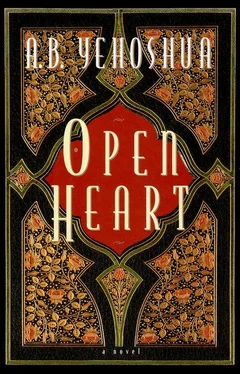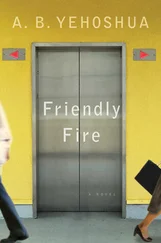“This may come as a surprise to you, Dr. Rubin, but the data are of no importance whatsoever here,” he replied immediately, in a tone that was beginning to sound threatening. “Of course I’ve seen them. Here they are,” and he whipped a folded piece of paper from his shirt pocket and spread it out in front of me. My heart skipped a beat at the sight of the gray Indian paper with the curly logo which I had brought from Calcutta. I wondered where it had disappeared to, and now I knew. Lazar and his wife had kept it to show to their professor friends, to check up on me behind my back and see if my panic in Varanasi was justified. “But why aren’t the data important?” I was no longer calm, and sensed that the attack was about to come from a completely unexpected direction. “If there were such high values of liver damage, if the transaminases rose to levels of a hundred and eighty and a hundred and fifty-eight, it’s clear that the clotting factors were also impaired. And I’m not even talking about the bilirubin, which reached nearly thirty. So why not strengthen the poor girl with some fresh, safe plasma, from someone as close as her mother, to help her overcome the bleeding? And the fact is, after my transfusion the bleeding stopped.”
“It stopped on its own, not because of you.” Professor Levine flung these words at me heatedly. “The clotting factors, which you thought you were giving her in your transfusion, are enzymes, not blood cells, and they behave completely differently in a transfusion. They’re absorbed and disappear — they’re ineffective unless they’re diluted in a special serum to bind them and prevent them from dissolving. But this, my friend, not even your excellent teachers in Jerusalem could have taught you, and you simply couldn’t have known. I don’t blame you, as Professor Hishin has already confessed that he forgot to give you my article, which I prepared specially for you, because I anticipated such complications with bleeding. But, Dr. Rubin, I do blame you for so recklessly endangering the mother, whom you could have infected with the daughter’s virus. When they told me in their innocence how you put off the return flight to New Delhi in order to perform a blood transfusion in that city of the dead of theirs, whose name I’ve forgotten, I was careful not to say a word to betray my horror at what you’d done. It’s a miracle that nothing happened. Sometimes God protects people from their doctors. But still, I asked myself, is this young man simply an idiot, who never learned the ABCs of performing a blood transfusion, or did he perhaps have some hidden purpose beyond my comprehension? And then, when I was asked to consider you for a temporary residency in my department, I thought at first, no, not him, I don’t even want to hear his name. But Lazar, and his secretary too, and even your Professor Hishin began putting pressure on me, and other people, objective people, said that you were really a conscientious young man, reliable and modest, and I must say, this is my impression too. So, Dr. Rubin, if you want to join our department, even on a temporary basis, I suggest that you spend the coming week in the library boning up on a few elementary laws of physics, such as the law of equilibrium, and consulting a biology textbook about the movement of viruses and how they multiply in the bloodstream, with particular attention to viruses B and C, which are interesting in themselves, and come back to me next week or the week after. There’s no hurry — come back and we’ll discuss it, so that you’ll understand for once and for all what a catastrophe you could have brought down on a perfectly healthy woman we’re all fond of, for the sake of your pointless theatrics.”
Now I remembered with a chill how my friend Eyal had spontaneously reacted in exactly the same way when I told him about the blood transfusion in Jerusalem. I could hardly suspect Eyal of inventing things for the sole purpose of tripping me up. So what was the truth of the matter? Had I really been so wrong? A shiver ran down my spine at the thought that Dori might believe I had done something reckless to endanger her health, and lose confidence in me as a doctor. But I also knew that I must on no account get into an argument now with this neurotic man. I had better behave in my best “Anglo-Saxon” manner, as my father proudly called it, and avoid a dispute, and not even confront him about the mortifying expression “your pointless theatrics.” I rose to my feet, my face burning, humiliated to the depths of my soul, and parted from him with hardly a word, or a promise either. Turning by mistake into the internal medicine ward and walking down the corridor between the rooms, where most of the patients were middle-aged or old and where my eyes suddenly flooded with tears, I thought to myself, No, it’s impossible, he’s wrong, his fears are imaginary, but I’ll never be able to prove to him how absurd his arguments are, because all he wants is to depress me, like Dr. Nakash said — yes, Nakash knows him, all right. And suddenly I felt a powerful desire to see Dr. Nakash, so that he would give me, in his simple, straightforward way, a foothold in the world, because now I felt that I had been finally banished from the hospital which up to a few months ago I was sure would become my true and final place in life. I looked for Nakash in the recovery room, but there I was told that he was in the operating room. Still, I didn’t want to give up the idea of seeing him, and I slipped into the wing. Through the window in the door I saw my friends from the surgical department standing there in their green gowns, and Dr. Nakash, dark and skinny, in a short white coat, his head close to the head of the patient. He soon noticed me and sent me a friendly wave, as a sign that I should wait for him. After a few minutes he came out to me. I told him about my meeting with Levine, including the vicious remark about my “pointless theatrics.” He wasn’t surprised; he only smiled and cursed under his breath. “I told you. He’s a difficult man — all he wants to do is depress you without giving you anything in return. Leave him alone. You don’t need him. Tomorrow night we’ve got a big private operation, and at the end of the month two more long, serious operations. I’ve recommended you to other anesthetists too. Don’t worry, Benjy, you won’t starve, you’ll specialize in anesthesiology, and you won’t regret it, because even if you go back to surgery in the end, it will give you a big advantage over your anesthetists. You’ll be able to get more out of them.”
He returned to the operating room to sit at the patient’s head while I hurried out of the hospital, which for the first time since I had started working there had become intolerable to me. Above all, I didn’t want to bump into anyone I knew from the medical staff and have to justify myself to him. Who could have imagined two months ago, when I stood in the big office between the two strongest, most influential men at the hospital, who saw me as the “ideal man” for the job and succeeded in persuading me to go to India, that things would turn out like this, that in this whole great hospital there was no room for me now, not even a temporary post, and that of all the hopes I’d cherished in the past year, all I’d be left with was a bizarre, impossible infatuation, which would now only make me suffer more? For if it had remained an abstract fantasy, as it had been until yesterday, it might still have been possible to extricate myself gradually, but now that my body had miraculously touched hers, I had committed not only my soul but also my body, which had been seared with pleasure, to go on and prove to myself that it was no passing episode, as she had announced with such confidence while she was quickly putting on her clothes. Because if I was the one who had started, only I could stop. And I didn’t want to stop, I didn’t want to stop.
Читать дальше












